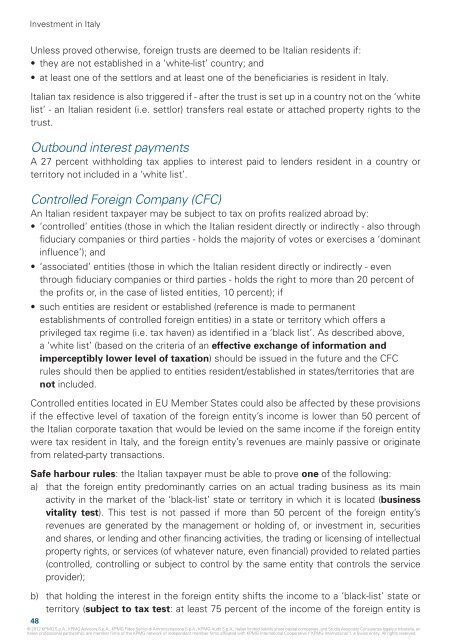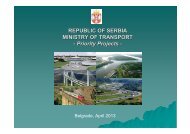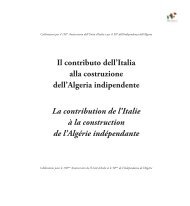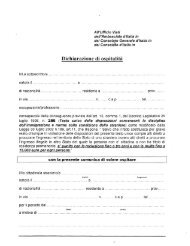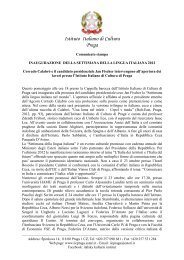Investment in Italy
Investment in Italy
Investment in Italy
- No tags were found...
Create successful ePaper yourself
Turn your PDF publications into a flip-book with our unique Google optimized e-Paper software.
<strong>Investment</strong> <strong>in</strong> <strong>Italy</strong>Unless proved otherwise, foreign trusts are deemed to be Italian residents if:• they are not established <strong>in</strong> a ‘white-list’ country; and• at least one of the settlors and at least one of the beneficiaries is resident <strong>in</strong> <strong>Italy</strong>.Italian tax residence is also triggered if - after the trust is set up <strong>in</strong> a country not on the ‘whitelist’ - an Italian resident (i.e. settlor) transfers real estate or attached property rights to thetrust.Outbound <strong>in</strong>terest paymentsA 27 percent withhold<strong>in</strong>g tax applies to <strong>in</strong>terest paid to lenders resident <strong>in</strong> a country orterritory not <strong>in</strong>cluded <strong>in</strong> a ‘white list’.Controlled Foreign Company (CFC)An Italian resident taxpayer may be subject to tax on profits realized abroad by:• ‘controlled’ entities (those <strong>in</strong> which the Italian resident directly or <strong>in</strong>directly - also throughfiduciary companies or third parties - holds the majority of votes or exercises a ‘dom<strong>in</strong>ant<strong>in</strong>fluence’); and• ‘associated’ entities (those <strong>in</strong> which the Italian resident directly or <strong>in</strong>directly - eventhrough fiduciary companies or third parties - holds the right to more than 20 percent ofthe profits or, <strong>in</strong> the case of listed entities, 10 percent); if• such entities are resident or established (reference is made to permanentestablishments of controlled foreign entities) <strong>in</strong> a state or territory which offers aprivileged tax regime (i.e. tax haven) as identified <strong>in</strong> a ‘black list’. As described above,a ‘white list’ (based on the criteria of an effective exchange of <strong>in</strong>formation andimperceptibly lower level of taxation) should be issued <strong>in</strong> the future and the CFCrules should then be applied to entities resident/established <strong>in</strong> states/territories that arenot <strong>in</strong>cluded.Controlled entities located <strong>in</strong> EU Member States could also be affected by these provisionsif the effective level of taxation of the foreign entity’s <strong>in</strong>come is lower than 50 percent ofthe Italian corporate taxation that would be levied on the same <strong>in</strong>come if the foreign entitywere tax resident <strong>in</strong> <strong>Italy</strong>, and the foreign entity’s revenues are ma<strong>in</strong>ly passive or orig<strong>in</strong>atefrom related-party transactions.Safe harbour rules: the Italian taxpayer must be able to prove one of the follow<strong>in</strong>g:a) that the foreign entity predom<strong>in</strong>antly carries on an actual trad<strong>in</strong>g bus<strong>in</strong>ess as its ma<strong>in</strong>activity <strong>in</strong> the market of the ‘black-list’ state or territory <strong>in</strong> which it is located (bus<strong>in</strong>essvitality test). This test is not passed if more than 50 percent of the foreign entity’srevenues are generated by the management or hold<strong>in</strong>g of, or <strong>in</strong>vestment <strong>in</strong>, securitiesand shares, or lend<strong>in</strong>g and other f<strong>in</strong>anc<strong>in</strong>g activities, the trad<strong>in</strong>g or licens<strong>in</strong>g of <strong>in</strong>tellectualproperty rights, or services (of whatever nature, even f<strong>in</strong>ancial) provided to related parties(controlled, controll<strong>in</strong>g or subject to control by the same entity that controls the serviceprovider);b) that hold<strong>in</strong>g the <strong>in</strong>terest <strong>in</strong> the foreign entity shifts the <strong>in</strong>come to a ‘black-list’ state orterritory (subject to tax test: at least 75 percent of the <strong>in</strong>come of the foreign entity is48© 2012 KPMG S.p.A., KPMG Advisory S.p.A., KPMG Fides Servizi di Amm<strong>in</strong>istrazione S.p.A., KPMG Audit S.p.A., Italian limited liability share capital companies, and Studio Associato Consulenza legale e tributaria, anItalian professional partnership, are member firms of the KPMG network of <strong>in</strong>dependent member firms affiliated with KPMG International Cooperative (“KPMG International”), a Swiss entity. All rights reserved.


